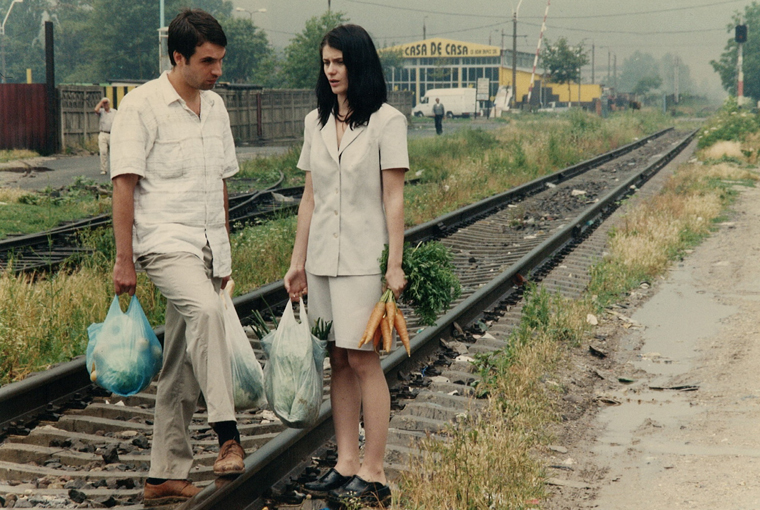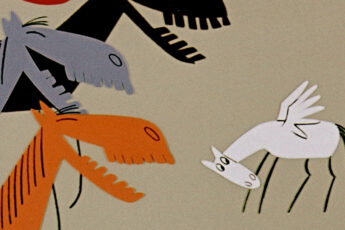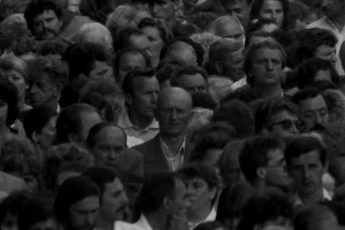
Plot: A savage community located somewhere in Europe’s forgotten periphery dreams of/has to face the unfamiliar standards of Western life-style. Of the films commented on this site, Morgen, Ryna, Love Sick, Ave, and Elena, deal with a variation of this plot. Other Romanian films, If I Want to Whistle, I Whistle or Francesca, also use a similar scheme. And there are many more.
While story, quality, and style of these films largely differ, there is always at least one character that has plans to start a new life in some Western European country (Morgen, Francesca, Ave); one that is already there (If I Want To Whistle I Whistle); one coming from Western Europe (Ryna); or the pressure to earn money and so-called Western liberalism is messing up the decent customs of the good old past (Love Sick, Elena).
Despite the radical change globalization, political shifts, and free market economy actually did bring to the former Soviet countries, the downside of this East-vs.-West-plot making is quite obvious. On the one hand, it suggests that the Western audience, to whom most of these films are oriented, is unable to understand anything that excludes them. On the other hand, it shows the East’s incapability to establish an independent culture. To make a film suitable for a Western audience by introducing the “West” as a character or conflict is thus cruelly submissive, although it is unclear whether this is because to include a “Western” element is the only guarantee for some of these films to secure their distribution in the West, or whether westernization is a self-inflicted imperative that lacks the basis of a real demand. In either way though, the “West” as a cine-political etiquette seems to imitate the problems these communities have with the West more than it subverts or even questions them. If economical misery, corruption, migration etc. are cast off as unique Eastern trademarks, the idea that the “West” could also be afflicted by these problems is turned into an absurd impossibility. When will this mentality change? In Berlin people still ask you if you are from the East or West, even if you were born after the fall of the Wall. As it is, most walls are mental.
Cristian Mungiu’s Occident deals with all of these East-vs.-West-plot issues. In the beginning of the film, moneyless and homeless Luci (Alexandru Papadopol) has to hand over his beautiful girlfriend Sorina (Anca Androne) to a jeep-driving Frenchman. He then works in a shopping mall, wearing the costume of a beer bottle as a human advertisement. At the mall, he meets Michaela (Tania Popa) who is disguised as a mobile phone. Michchaela is in a similar situation, not only job-wise. She was supposed to get married but her husband didn’t show up at the wedding ceremony. Now her family is trying to organize a foreign substitute-groom. But the exotic prince charming from Italy doesn’t quite fulfill her dreams.
Theme-wise, everything is westernized in this film. There is the hope of being saved by the rich Westerner (the Italian), the hope of saving oneself in the West (Sorina), and the disillusion about economic liberalism (humans metamorphosing into merchandise). And yet Mungiu’s film radically differs from the accounts of the same conflict his contemporaries offer. Most astonishingly, the characters in Occident don’t give the illusion that the fulfillment of their “Western” aspirations will actually make their life any better, nor does it demonstrate how it gets worse. In this point, Occident stands alone against the above mentioned films, where suspense and character identification are conditioned by the fulfillment or non-fulfillment of the “Western” promise. In Occident, the West only appears as the shifting of a frame, but is never able to actually construct a filling content. It is just not convincing to think that Sorina left Luci because of the opportunity offered by the Frenchman. Nor is Luci’s job in the shopping mall stylized into a melancholy soul-selling activity. The merit of Mungiu’s film is to remind us that human illusions and disillusions reach beyond the borders of political frames.
Mungiu’s Occident is thus not a film about the hope of Romanians to become part of the EU (the film is from 2002), nor about the disillusion that false promises of prosperity and liberalism might bring. The characters in Occident are too immersed into their personal problems too even notice the “change” surrounding them.




this article is ignorant, condescending, unprofessional… and many more